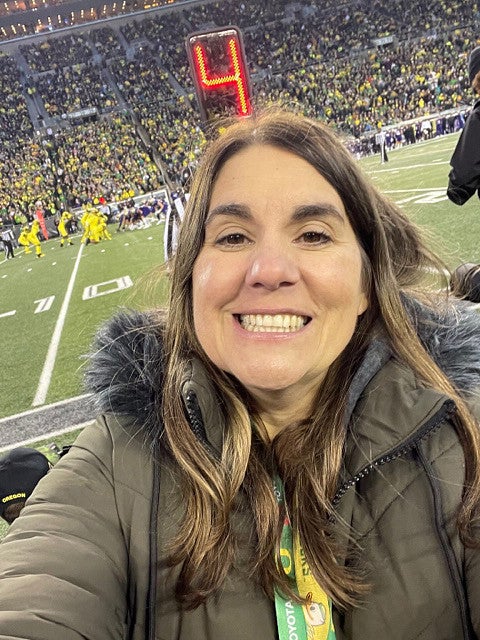
Learn more about Jen Doty, PhD, Associate Professor, Counseling Psychology and Human Services, through our Faculty Spotlight series.
Hometown: Chicago, IL
Primary research interest: I study how to leverage parent child relationships and technology to improve adolescent health.
Favorite book or movie: Range: Why Generalists Triumph in a Specialized World by David Epstein. I’m always recommending it to people. I find it such a good resource to think about our experiences and not have anxiety about career paths.
Hobbies: Hiking, reading, yoga, and watching shows and movies with my husband. I also like to test out my research strategies with my own three adolescents and young adults in my spare time!
Say “hello!”: LinkedIn; Twitter
What brought you to the University of Oregon?
I have watched the research coming out of the University of Oregon for a long time now. The parent-based prevention is among the best in the nation. Several years ago, I reached out to Beth Stormshak, PhD to see if she would be willing to mentor me from a distance, and she said yes. Then, when an opportunity arose, I jumped at the chance to transition to the University of Oregon. It’s a great fit for me and being on the West Coast gets us closer to family.
Tell us more about your research focus and why you were drawn to it.
There are really two parts to my research focus. When I think about technology, part of it is about reaching parents online and using technology to connect with them. Then the other part of it is helping parents with what's going on with technology in their own homes. That piece of it, in particular, was informed and driven by several years of my own experiences as a parent of adolescents. I saw what they were going through in terms of bullying and social comparisons and their friends texting in the middle of the night and I realized, from a real hands-on parenting point of view, that some of these things aren’t going well for our teens in general. Following that experience, I really wanted to understand the research and understand how to support parents with what's going on with social media, internet use, cyberbullying, and those kinds of things.
Why do you think your work is important?
If you think about this generation of parents, we are the first generation that has had to parent teenagers around these issues of technology. On top of that, we are not digital natives ourselves, so we can't rely on what we did growing up, or on what our parents did when we were growing up. All of this work is really breaking new ground. I see a lot of parent anxiety around some of these issues, and I know many parents feel overwhelmed about how to handle this stuff. We’re working to create guidelines for parents, and a parent-based prevention program that can be delivered online. I’m part of a grant funded by the National Institutes of Health to create online modules for parents using the T.E.C.H. parenting model, and we’re testing those right now. Hopefully, they will be ready for prime time soon. I feel strongly that this a critical need in our society right now.
What message would you like to share with students considering coming to the College of Education?.
There is so much going on right now in the frontiers of technology and artificial intelligence—but I believe what's really going to be valuable in the future is knowing how to interact with people and having those human skills and the human touch. If you're coming to our department, Counseling Psychology and Human Services, you get that. You learn counseling skills, human services skills, family skills, and that's what's needed for our future.
What do you love about Oregon?
I love the crisp air. Before I came to Oregon, I lived most recently in Florida, where the air was very muggy. Prior to that, I was in Minnesota, and I just love the moderate weather here. I love the beauty of this place. The skylines, the trees, the waterfalls… it's just gorgeous.
The College of Education at the University of Oregon is known for its cutting-edge research, and since I’ve gotten here I’ve been able to see what is behind that success. Part of it is the collegial atmosphere—everyone has been so willing to share materials and give feedback on my work. Another part of it is the interdisciplinary feel of the college—at other institutions, our department was very isolated, but here everyone works across department lines. That’s pretty unique!
